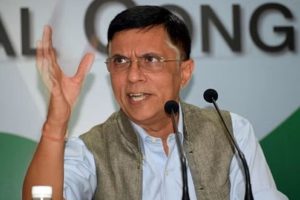Artificial Intelligence (AI) as one of the frontier technologies is shaping India’s present and future economy. India has started seeing the impact of Artificial Intelligence across healthcare, agriculture, education, governance and financial services.
Stating this Union Minister of State (Independent Charge) Science and Technology, Earth Sciences Jitendra Singh said innovation ecosystem in India is providing companies new opportunities to create value, evolve and grow.
Advertisement
The minister said, India is at the pivotal point with the technologies shaping up for the future like Artificial Intelligence, Advanced manufacturing, block chain, green energy, quantum computing, getting ready to make one of the biggest technology transformations of the century.
Jitendra Singh’s remarks came while addressing the 27th edition of the DST-CII Technology Summit 2021 with Brazil, Canada, Russia & the Netherlands as country partners in New Delhi on Friday.
Focco Vijselaar, Vice Minister, Ministry of Economic Affairs and Climate Policy, The Netherlands, S Chandrashekhar, Secretary, Department of Science and Technology, Government of India, TV Narendran, President CII (2021-2022) and CEO & Managing Director, Tata Steel Limited, Marten van den Berg, Ambassador of the Netherlands to India, Vipin Sondhi, Chairman, CII National Committee on Technology, R&D and Innovation, and MD and CEO, Ashok Leyland Ltd., Chandrajit Banerjee, Director General, Confederation of Indian Industry (CII), Sanjeev K Varshney, Head, International Cooperation, Department of Science & Technology, Government of India participated in the Summit.
The Union Minister said the Centre was creating an enabling innovation ecosystem with recent reforms like design linked incentives for semiconductors, PLI schemes for automobiles, drone policy and removing barriers through initiatives like faceless assessment.
“In recent past, India has launched several other flagship initiatives as well such as National Mission on Interdisciplinary Cyber-Physical Systems(ICPS); Quantum Computing and Communication; National Mission on Supercomputing, Electric Mobility, Green hydrogen, etc,” Singh said.
“Department of Science and Technology has been working closely with CII for various policy measures towards Research and Development including the New Science, Technology and Innovation policy, and the technology vehicles like GITA,” the minister added
Underlining the need to take all the initiatives to the next level, Jitendra Singh said the platform like DST-CII Technology Summit offers a plethora of opportunities for collaborations in the critically important technology areas across sectors such as healthcare, water, agriculture, energy, IT, digital and several others. He said the time is opportune to appreciate and evaluate our evolutionary journey, and set us on a path of technology leadership, fueled by the spirit of Atmanirbhar Bharat.
Enlisting the initiatives being taken by DST, the Union minister referred to NIDHI (National Initiative for Developing & Harnessing Innovations), which addresses the entire value chain of Innovations. He said NIDHI has significantly impacted India’s innovation ecosystem by nurturing 3,681 startups through a network of 153 incubators created by DST, which generated more than 65,000 jobs as cumulative direct employment, and generated nearly 2000 intellectual properties
Singh also mentioned Sophisticated Analytical & Technical Help Institutes (SATHI), a new scheme to build a shared, professionally managed, S&T infrastructure for industry, MSMEs and Startups. “This will provide easy access for pursuing research on the high end and sophisticated equipment and will further strengthen the innovation ecosystem,” he said.











